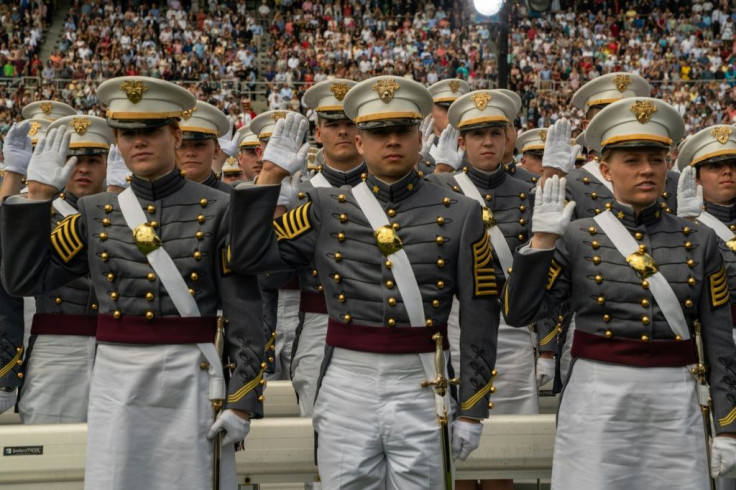Is Trump Sick? Videos Of Him Walking, Drinking Water Raise Questions About President's Health

KEY POINTS
- Trump's speech at West Point is now mostly remembered for signs raising questions over his health
- The first sign was symptoms of what might be motor or phonic "tics"
- The second could point to a case of "bathmophobia"
President Donald Trump again reignited widespread speculation about the state of his health when he showed difficulty in lifting a glass of water with one hand. He also had visible difficulty walking down a gently sloping ramp, and couldn't correctly pronounce the names, MacArthur and Ulysses. Trump pronounced MacArthur as”MacGarther” and Ulysses as “Ulyssius.”
These very public signs of what some doctors say could be symptoms of a neurological malady were plain for the world to see Friday (June 12), when Trump was at the United States Military Academy at West Point, New York. At one point in his commencement speech, Trump paused to take a sip of water.
Videos showed Trump reaching for the small glass of water with his right hand. He brings the glass to his chin and then can't seem to move the glass any higher. He used his left hand to push his trembling right hand up and took a quick sip, looking embarrassed all the time.
As his speech ended, Trump was escorted off stage by the academy’s superintendent, Lt. Gen. Darryl Williams, but had to walk down a ramp outfitted with anti-skid strips to get to the ground. Videos show the unsteady Trump taking careful baby steps as he descended, looking at the ramp all the time. It was a warm, sunny day and Trump looked relieved when he finally left the ramp.
This is the second time in two weeks Trump has apparently had motor problems. On May 25, during the Memorial Day ceremony at the Arlington National Cemetery, Trump showed clear difficulty lifting a wreath, also with his right arm.
Trump descended a ramp extremely carefully at the end of his West Point speech today pic.twitter.com/uMG3KyB1V1
— Aaron Rupar (@atrupar) June 13, 2020
The videos from West Point and Arlington again resurrect questions about the true state of Trump's health. Some medical professionals believe Trump’s difficulty with his right hand is due to a "motor tic." Tics can be signs of potentially serious medical problems. It might increase because of stress, fatigue, boredom or high-energy emotions, such as anxiety.
Trump still hasn't totally figured out how to drink water pic.twitter.com/IO8CDXmD9i
— Aaron Rupar (@atrupar) June 13, 2020
“This is a persistent neurological sign that, combined with others, would be concerning enough to require a brain scan,” tweeted Dr. Bandy Lee, a Yale psychiatrist.
There might also be another explanation for Trump's excessive carefulness in descending the ramp. He might have "bathmophobia," which is an irrational fear of stair or ramps. Bathmophobia is linked to a fear of heights.
That this might be the case was first noticed in January 2017 when Trump suddenly gripped the hand of former British prime minister Theresa May as they walked together at the White House.

Trump's obvious physical failings at West Point quickly lighted up Twitter. Many of the comments poked fun at Trump, who took notice. On Saturday, Trump tweeted in his defense: "The ramp that I descended after my West Point Commencement speech was very long & steep, had no handrail and, most importantly, was very slippery. The last thing I was going to do is “fall” for the Fake News to have fun with. Final ten feet I ran down to level ground. Momentum!"
Critics noted the ramp was neither long nor steep. Neither was the ramp slippery because it hadn't rained. The ramp also had anti-skid strips. And Trump didn't run the final 10 feet down the ramp as could be seen in the videos.
© Copyright IBTimes 2025. All rights reserved.





















